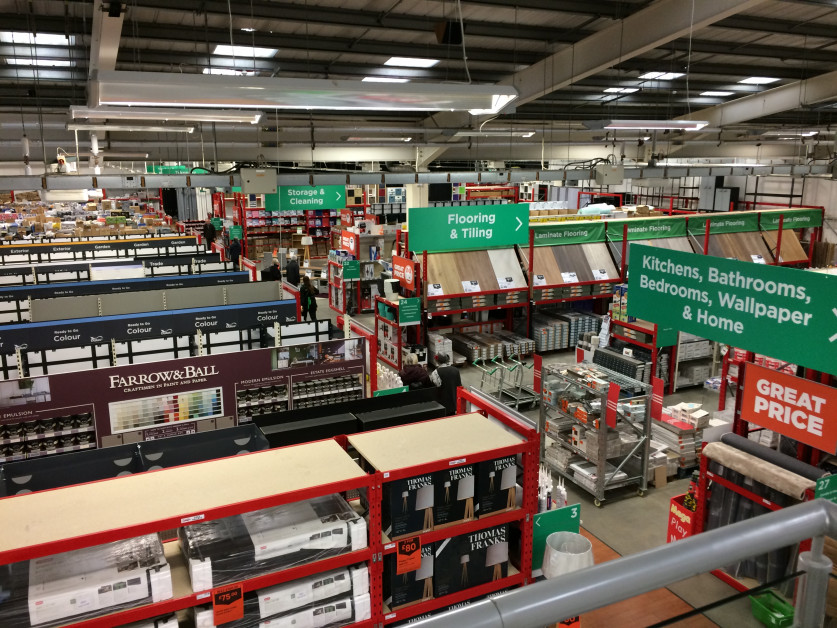Finding The Best (and Avoiding The Worst) UK DIY Retailers

Table of Contents
Top-Rated UK DIY Retailers for Quality and Selection
Choosing the right retailer for your DIY needs depends on various factors, including budget, project scope, and product availability. Here are some of the top contenders in the UK DIY market:
B&Q – The UK DIY Giant
B&Q is a household name synonymous with DIY in the UK. Its vast network of stores and extensive online presence make it a convenient choice for most projects.
- Wide Product Range: From basic tools and screws to extensive building materials, B&Q boasts a comprehensive inventory. They cater to both small home repairs and large-scale renovations.
- Extensive Store Network: Finding a B&Q store is usually straightforward, regardless of where you are in the UK. This easy accessibility is a major advantage.
- Competitive Pricing and Sales: B&Q regularly offers discounts and sales, making it possible to find great deals on various products. Keep an eye out for their promotional offers.
- Convenient Online Ordering and Click & Collect: B&Q's robust online platform allows you to browse and order products for home delivery or convenient click-and-collect from your local store.
- Potential Downsides: Popular stores can be very busy, potentially leading to longer queues. Product availability can fluctuate depending on location and demand.
Wickes – A Strong Competitor
Wickes provides a strong alternative to B&Q, often competing on price and offering a similarly comprehensive range.
- Value for Money: Wickes is known for its competitive pricing strategy, making it an attractive option for budget-conscious DIYers.
- Solid Product Selection: They offer a good selection of tools, timber, paint, and other decorating supplies, catering to most home improvement needs.
- Strong Online Presence and Home Delivery: Similar to B&Q, Wickes offers a user-friendly online store with home delivery options for added convenience.
- Generally Helpful Staff: While individual experiences vary, Wickes generally receives positive feedback regarding the helpfulness of its staff.
- Potential Downsides: Compared to B&Q, the product range in some smaller Wickes stores might be slightly more limited.
Homebase – Focus on Home Improvement
Homebase positions itself as a more specialist retailer focusing on home improvement projects.
- Curated Selection: Homebase offers a curated range of products, often emphasizing higher quality and more stylish options.
- Emphasis on Customer Service: Homebase often receives praise for its customer service, although individual experiences may vary.
- Potential Downsides: Expect to pay slightly higher prices compared to B&Q or Wickes. Store availability is less widespread than the larger chains. Check online for local stock levels.
Smaller, Specialist UK DIY Retailers
Don't overlook the charm and expertise of local, independent hardware stores!
- Specialized Advice and Unique Products: Independent retailers often possess unparalleled knowledge and can offer personalized advice tailored to your specific project. They may also stock unique or hard-to-find items.
- Personalized Service: The level of personal service you receive at a smaller store can be invaluable, especially for complex projects.
- Potentially Higher Prices: Expect to pay a premium for the personalized service and specialized products offered by smaller retailers.
- Supporting Local Businesses: Choosing a local store directly supports your community.
Red Flags: Avoiding Poor UK DIY Retail Experiences
While many UK DIY retailers provide excellent service, some fall short. Watch out for these red flags:
Poor Customer Service
Negative customer service experiences can significantly impact your DIY project.
- Check Reviews: Before choosing a retailer, check online reviews on sites like Trustpilot, Google Reviews, and others to see what other customers have reported.
- Look for Patterns: Pay attention to recurring negative comments regarding unhelpful or rude staff.
- Social Media Monitoring: Social media platforms often reveal customer experiences and complaints, providing valuable insights.
Product Availability Issues
Nothing is more frustrating than arriving at a store only to discover the essential item is out of stock.
- Check Online Stock: Always check online stock levels before traveling to a physical store.
- Read Reviews: Customer reviews may highlight frequent out-of-stock items or supply chain issues.
- Be Prepared for Substitutions: Have backup plans in case the specific product you need is unavailable.
High Prices and Hidden Costs
Hidden costs can quickly escalate the total cost of your project.
- Compare Prices: Compare prices across multiple retailers before committing to a purchase.
- Delivery Charges: Factor in delivery charges, especially for bulky items.
- Returns Policies: Understand the retailer's returns policy to avoid unexpected fees.
- Vouchers and Loyalty Programs: Check for discounts, vouchers, and loyalty programs to save money.
Poor Returns Policy
A difficult or expensive returns process can turn a positive experience sour.
- Read the Fine Print: Carefully review the retailer's returns policy before purchasing.
- Time Frame and Conditions: Pay attention to the timeframe for returns and any conditions that might apply.
- Return Fees: Be aware of any potential restocking fees or other charges associated with returning items.
Tips for Choosing the Best UK DIY Retailer for Your Needs
Choosing the right UK DIY retailer requires careful consideration. Here are some additional tips:
- Project Scope: Large projects might benefit from a specialist retailer with expertise in specific areas, while smaller projects might be adequately served by larger retailers.
- Online Reviews: Utilize online reviews to gain insights into other customers' experiences with different retailers.
- Pricing Comparison: Compare prices across various retailers to ensure you are getting the best value for your money.
- Location and Convenience: Choose a retailer with convenient access and opening hours that fit your schedule.
- Product Range: Ensure the chosen retailer stocks the specific products and materials required for your project.
Conclusion
Finding the right UK DIY retailer is crucial for a successful home improvement project. By considering factors like product range, customer service, pricing, and returns policies, you can confidently choose the best option for your needs and avoid disappointing experiences. Whether you opt for a large national chain like B&Q or Wickes, or a smaller, specialized store, remember to research and compare before making your purchase. Start your search for the perfect UK DIY retailer today and unleash your inner DIY enthusiast!

Featured Posts
-
 Temukan Hiburan Terbaik Program Tv Ramadan 2025 Untuk Keluarga
Apr 23, 2025
Temukan Hiburan Terbaik Program Tv Ramadan 2025 Untuk Keluarga
Apr 23, 2025 -
 Reds Historic Losing Streak A 1 0 Defeat Sets Unprecedented Mlb Record
Apr 23, 2025
Reds Historic Losing Streak A 1 0 Defeat Sets Unprecedented Mlb Record
Apr 23, 2025 -
 Trumps Immigration Policies Shattered Canadian Dreams Of Us Relocation
Apr 23, 2025
Trumps Immigration Policies Shattered Canadian Dreams Of Us Relocation
Apr 23, 2025 -
 France Faces Early Elections Macrons Gamble
Apr 23, 2025
France Faces Early Elections Macrons Gamble
Apr 23, 2025 -
 Record Nine Stolen Bases Power Brewers To Victory Over As
Apr 23, 2025
Record Nine Stolen Bases Power Brewers To Victory Over As
Apr 23, 2025
